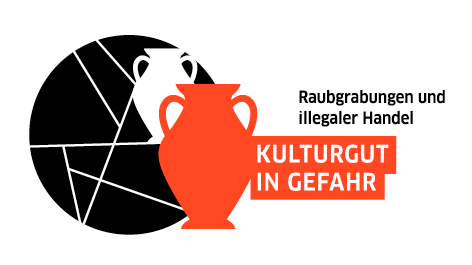Bereichsnavigation
Kulturgut in Gefahr: Öffentlicher Abendvortrag von Neil Brodie
News vom 06.12.2014
Im Rahmen der internationalen Tagung „Kulturgut in Gefahr: Raubgrabungen und illegaler Handel“ hält Neil Brodie den öffentlichen Abendvortrag zum Thema „Transnational Organized Crime and the Antiquities Trade”. Brodie ist seit 2012 Senior Research Fellow am Scottish Centre for Crime and Justice Research der University of Glasgow. Der Abendvortrag findet am 11. Dezember 2014 in der Rotunde im Alten Museum statt. On the occasion of the international conference “Cultural Heritage in Danger: Illicit excavations and trade” Neil Brodie will give the evening lecture on “Transnational Organized Crime and the Antiquities Trade”. Since February 2012, Brodie has been Senior Research Fellow at the Scottish Centre for Crime and Justice Research at the University of Glasgow. The evening lecture will take place on 11th December 2014 at the Rotunda of the Altes Museum.

– English version below –
Die verheerenden Auswirkungen des illegalen Handels mit Kulturgütern auf das archäologische Erbe und die Forschung sind bekannt. Wie der illegale Handel organisiert ist, dürfte dagegen weniger bekannt sein. Wie bei jedem kriminellen Unternehmen haben die Täter ausgeklügelte Strategien entwickelt, um ihre Taten zu verschleiern.
Im Vortrag wird dargestellt, was man aktuell über die Organisation des illegalen Handels mit Kulturgütern weiß und es wird gemutmaßt, was alles noch nicht bekannt ist. Zunächst werden die derzeit gängigen Definitionen für organisierte Kriminalität erörtert und überlegt, inwiefern diese Definitionen geeignet sind, die Praktiken und Institutionen zu beschreiben, die den illegalen Antikenhandel bilden. Anhand von Fallbeispielen wird gezeigt, welche Folgen illegaler Antikenhandel in den unterschiedlichsten Regionen der Welt hat. Im Vortrag wird anschließend erläutert, welche – möglicherweise begünstigenden – Auswirkungen Globalisierung und neoliberale Deregulierung auf den illegalen Antikenhandel haben. Schließlich wird diskutiert, wie relevant im 21. Jahrhundert eine öffentliche Ordnung sein kann, die darauf abzielt einen Antikenhandel zu kontrollieren, der tief in den Gegebenheiten der Mitte des 20. Jahrhunderts wurzelt.
Neil Brodie promovierte 1991 an der University of Liverpool in Archäologie. Er bekleidete verschiedene Positionen an der British School in Athen, am McDonald Insititute for Archeological Research an der University of Cambridge, wo er Wissenschaftlicher Direktor am Illicil Antiquities Research Centre war, und am Archäologischen Zentrum der Stanford University . Seit Februar 2012 ist er Senior Research Fellow am Scottish Centre for Crime and Justice Research der University of Glasgow. Dort untersucht er im Rahmen des ERC-geförderten Trafficking Culture Projektes Kriminologie und Ökonomie des Antikenhandels. Neil Brodie hat zahlreiche Publikationen zum Antikenhandel verfasst und an archäologischen Projekten in Großbritannien und Griechenland mitgearbeitet.
The damaging effects of the antiquities trade upon archaeological heritage and scholarship are well known. How the trade is criminally organized is something that is rather less well known. As with any other criminal endeavor, the wrongdoers have developed sophisticated stratagems that are intended to conceal any indications or evidence of their malpractice. This lecture will describe what is presently known about the criminal organization of the antiquities trade and speculate about what is not known. It will start by considering current definitions of organized crime and their suitability for characterizing the practices and institutions that constitute the antiquities trade. Next, by way of several case studies from different areas of the world, it will set out the current state of knowledge and discuss some implications. The lecture will then examine the possible facilitating effects of globalization and neoliberal deregulation, before finally looking at the relevance in the twenty-first century of a public policy aimed at controlling the antiquities trade that is rooted in mid-twentieth century concerns and actualities.
Neil Brodie graduated from the University of Liverpool with a Ph.D. Archaeology in 1991 and has held positions at the British School at Athens, the McDonald Institute for Archaeological Research at the University of Cambridge, where he was Research Director of the Illicit Antiquities Research Centre, and Stanford University’s Archaeology Center. Since February 2012 he has been Senior Research Fellow at the Scottish Centre for Crime and Justice Research, at the University of Glasgow, where he is researching the criminology and economics of the antiquities market as part of the ERC-funded Trafficking Culture project. He has published widely on issues concerning the antiquities market and has worked on archaeological projects in the United Kingdom and Greece.
Weiterführende Links
- Gesamtes Programm der Tagung „Kulturgut in Gefahr“
- Deutsches Archäologisches Institut
- Deutscher Verband für Archäologie
- Folgen Sie uns auf Twitter: @SPK_Kulturgutschutz

